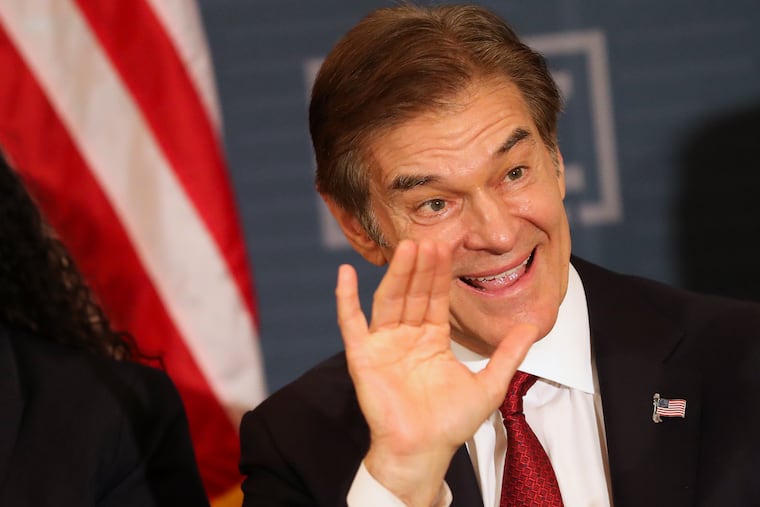Mehmet Oz said he wouldn’t take corporate PAC money. Then he did.
Mehmet Oz said he wouldn't take "one dime of corporate PAC money, not one dollar." But his latest fund-raising report shows donations from major energy companies, law firms, and other big businesses.

When Mehmet Oz starting running for Senate in Pennsylvania, he made a promise: He wouldn’t accept “one dime” from corporate political committees.
“For too long, Washington’s been run by special interests and corporate donors,” Oz said in a video posted on Twitter in January. “I’m making this pledge: I will not take one dime of corporate PAC money, not one dollar. I cannot be bought.”
Except he did.
Thank you for subscribing to our newsletter!
Oz’s latest fund-raising report shows at least eight donations from political committees registered as corporate PACs with the Federal Elections Commission.
Some of them include the political arms of major businesses. One $5,000 donation came from the PAC affiliated with Energy Transfer, a Dallas pipeline company that in 2012 purchased Sunoco LP and now owns the Mariner East pipeline that crosses Pennsylvania, among other energy interests. A $2,500 donation is from the PAC associated with Alliance Coal, part of Alliance Resource Partners, a coal, oil, and gas outfit based in Tulsa, Okla. Oz has been an outspoken advocate for increased natural gas drilling and energy production.
Other contributions came from the political committees tied to two of Pennsylvania’s most prominent law firms — Cozen O’Connor and Duane Morris — and Bloomin’ Brands, the parent company of Outback Steakhouse.
In all, the eight corporate PACs gave Oz $23,500, public disclosures show. It’s a small fraction of the roughly $12 million Oz has raised for his Senate campaign, not to mention the $21 million of his own money that he has spent.
But an aide to Democratic Senate nominee John Fetterman said the donations show Oz can’t be trusted.
“Dr. Oz will lie to anyone about literally anything if it means helping himself because this fraud has no core values,” said Fetterman spokesperson Joe Calvello. “”Oz pocketed over 200,000 dimes worth of corporate PAC money last quarter because he’s incapable of being honest and bought and paid for by special interests.”
An Oz spokesperson, Brittany Yanick, said the campaign was already planning to refund the $2,500 donation from Bloomin’ Brands. (That would show up on the public disclosures due later this month.)
And she argued that law firms may register their political committees as corporate PACs for liability reasons.
But she didn’t address the donations from other companies’ PACs, including those of Energy Transfer, Alliance Resource Partners, or Essential Utilities, a Bryn Mawr-based utilities corporation.
“Dr. Oz made a pledge not to take one dime of corporate PAC money, and he has not done so,” Yanick said.
But Oz’s campaign finance report does include money from corporate PACs.
The two other corporate PAC donors are those associated with the Pennsylvania law firm Capozzi Adler and the Alabama Farmers Federation, a trade group.
Businesses can only create corporate PACs if they elect to be treated as corporations for federal tax purposes, said Larry Noble, a former FEC general counsel. That’s why political committees associated with law firms and even trade organizations are often considered “corporate PACs” by the FEC, even if the companies themselves are organized as limited partnerships, limited liability companies, or other designations. (Several of the Oz donors fall into those categories.)
Businesses aren’t allowed to donate directly to candidates, but corporate PACs give them a workaround. Such PACs can collect donations from executives and other high-level employees and then contribute to campaigns, within federal limits. The PACs can’t use the corporate funds to pay for donations, but the companies can pay for PAC administrative costs, such as a treasurer or filing expenses.
Oz overall raised about $8 million in the fund-raising period covering July, August, and September, the same period that included donations from these PACs, and he added $7 million of his own money. He had $2.5 million in his campaign fund as of Sept. 30.
Fetterman raised more than $22 million in the same period, about half of it coming from people who gave less than $200 total. He had $4.2 million remaining as of Sept. 30, and has vowed not to take corporate PAC money.
Staff writer Andy Maykuth contributed to this report.
